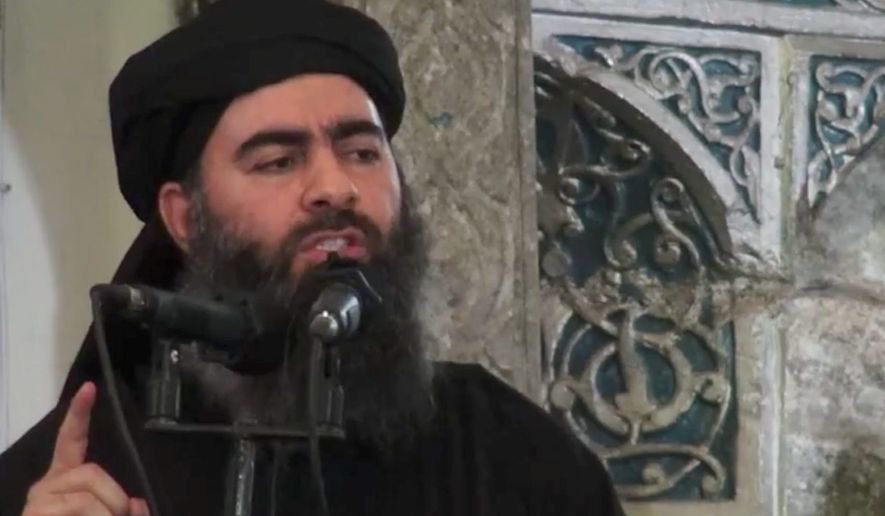A special intelligence adviser to Army Gen. David H. Petraeus during the 2007 troop surge says the terrorist leader now ruling over large swaths of Iraq and forcing Christians to convert to Islam has long been the most elusive big game for the U.S.
“We had at least three times when we thought we killed [Abu Bakr al-Baghdadi],” said retired Army Col. Derek Harvey. “At least three times.”
As an intelligence officer, Mr. Harvey acquired near-mythical status: He spent two decades studying Iraq, Saddam Hussein’s regime and the complex tribal networks that form the country’s political fabric. He had the ear of the top brass.
“Best military intelligence officer I ever knew,” said retired Army Gen. John Keane, who helped devise the surge strategy of occupying neighborhoods and pulling Sunni fighters to the American side.
The failure to kill al-Baghdadi before he rose to the top and unleashed a June offensive that snatched towns and villages was underscored again last week. Fixed on Baghdad, his terrorist army — the Islamic State — launched its first car bomb assault, his favorite method, since the network broke out of the city of Mosul last month.
After U.S. troops exited Iraq in 2011, al-Baghdadi’s men perfected the use of car bombs as killing machines. Last week, six car bombs were detonated in and around Baghdad. The Institute for the Study of War said as many as 90 people were killed.
Meanwhile, the institute said, al-Baghdadi is trying to weave his harsh vision of Islam into the fabric of Iraqi life with pronouncements on women’s dress, marriage and property rights.
On Sunday, the vast majority of Christians in Mosul had fled to Kurdish-protected areas ahead of an Islamic State deadline for them to convert to Islam, pay a tax or face death. Militants began occupying churches and homes of Christians who fled, Mosul residents told The Associated Press.
Mr. Harvey, now director of research at the University of South Florida’s Global Initiative on Civil Society and Conflict, was inserted into Baghdad after the 2003 invasion. He returned for the 2007 troop surge to become Gen. Petraeus’ right-hand man for intelligence and understanding the Sunni insurgency, of which al-Baghdadi, then known as Abu Du’a, was a rising star.
In an interview, Mr. Harvey discussed why al-Baghdadi was released from U.S. custody in 2004 and the tradecraft he has since used to evade capture.
He concludes that al-Baghdadi, who heads the Islamic State, is superior to al Qaeda in Iraq founder Abu Musab Zarqawi and better than Osama bin Laden in some respects.
“The success he’s had and his longevity are remarkable,” Mr. Harvey said.
During the early days of the Sunni insurgency, the U.S. picked up al-Baghdadi in February 2004 in Fallujah. In their possession was a murderous jihadist and mullah committed to both Zarqawi and bin Laden. The problem was that the command did not have a centralized database from which review boards could read all about him.
“What we did not have was good detainee packages on those folks that provided circumstances — why they were arrested, who they were arrested with,” Mr. Harvey said. “It was a real failing of the procedures.”
By December 2004, al-Baghdadi’s review board had no choice but to release him unconditionally, the Pentagon said. Within months, as intelligence started to improve, the command discovered that Abu Du’a was one of the most vicious Zarqawi operatives.
In 2005, U.S. forces fired a missile on a house in northern Iraq and then issued a press release saying he was likely killed. A week later, they found out he was not.
Mr. Harvey said that happened again — another precision weapon on a house they were sure held al-Baghdadi, but he was not there. Then there was a direct raid on a house based on the signal from a communication device he supposedly was using.
“Whoever was holding the handset was killed,” Mr. Harvey said. Again, it was not al-Baghdadi. “Clearly, we didn’t have him.”
How so elusive? Mr. Harvey said al-Baghdadi practices excellent spycraft, perhaps learned from Saddam Hussein’s intelligence operatives who have joined him. Al-Baghdadi passes off cellphones after limited use and dispenses fake information about his whereabouts.
In 2010, he tricked the allies again. The coalition announced on state TV the arrest of Abu Du’a in Fallujah and, thus, the end of al Qaeda in Iraq, which he then ran. Whomever they captured was not Abu Du’a.
The current scorecard — imprisoned and released, thought to have been killed at least three times, and thought to have been arrested once.
“We would look at him as a highly skilled adversary with some diversion aspects to how he orchestrates his movements,” said Mr. Harvey. “Sending false signals. Telling certain people he would be at that place when in fact he would not be at that site.
“He has relied on some highly skilled former Iraqi intelligence folks that have some good tradecraft skills they brought to the organization and to him,” the terrorist hunter said.
Mr. Harvey said if al-Baghdadi is to be liquidated, it most likely will have to come from a rival terrorist group or from Iraqi Sunnis who sided with the U.S. in eliminating al Qaeda in Iraq.
More than 100,000 Sunnis joined the “Awakening.” It might have to happen again.
“That’s the way you get after this problem in the end,” Mr. Harvey said. “Unless there is more pressure to contain his operating environment, he’s going to have more freedom and can hide and operate at the same time.”
• Rowan Scarborough can be reached at rscarborough@washingtontimes.com.




Please read our comment policy before commenting.